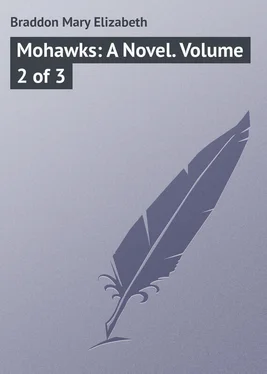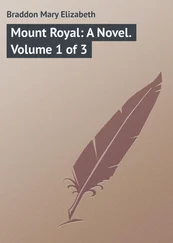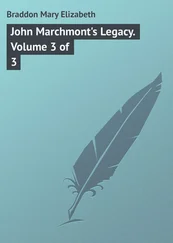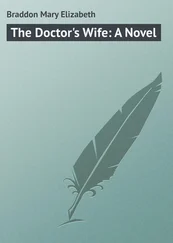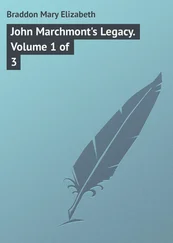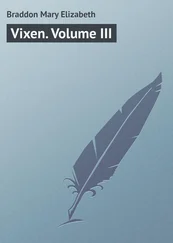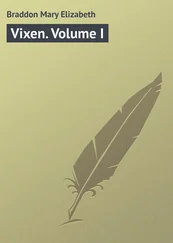Mary Braddon - Mohawks - A Novel. Volume 2 of 3
Здесь есть возможность читать онлайн «Mary Braddon - Mohawks - A Novel. Volume 2 of 3» — ознакомительный отрывок электронной книги совершенно бесплатно, а после прочтения отрывка купить полную версию. В некоторых случаях можно слушать аудио, скачать через торрент в формате fb2 и присутствует краткое содержание. Жанр: foreign_prose, на английском языке. Описание произведения, (предисловие) а так же отзывы посетителей доступны на портале библиотеки ЛибКат.
- Название:Mohawks: A Novel. Volume 2 of 3
- Автор:
- Жанр:
- Год:неизвестен
- ISBN:нет данных
- Рейтинг книги:3 / 5. Голосов: 1
-
Избранное:Добавить в избранное
- Отзывы:
-
Ваша оценка:
- 60
- 1
- 2
- 3
- 4
- 5
Mohawks: A Novel. Volume 2 of 3: краткое содержание, описание и аннотация
Предлагаем к чтению аннотацию, описание, краткое содержание или предисловие (зависит от того, что написал сам автор книги «Mohawks: A Novel. Volume 2 of 3»). Если вы не нашли необходимую информацию о книге — напишите в комментариях, мы постараемся отыскать её.
Mohawks: A Novel. Volume 2 of 3 — читать онлайн ознакомительный отрывок
Ниже представлен текст книги, разбитый по страницам. Система сохранения места последней прочитанной страницы, позволяет с удобством читать онлайн бесплатно книгу «Mohawks: A Novel. Volume 2 of 3», без необходимости каждый раз заново искать на чём Вы остановились. Поставьте закладку, и сможете в любой момент перейти на страницу, на которой закончили чтение.
Интервал:
Закладка:
Herrick entered the House determined that the member for Bossiney should no longer rank among dumb-dogs. Despite his success at the University as an after-supper speaker, he was not a great orator, not a man to thrill the House, but he was a clever debater, and he knew when and how to raise a laugh against his antagonist. He was skilled in all the passes of senatorial fence; for as some men are by instinct orators, so are some by instinct debaters. He had a knack of asking damaging questions, and seemed almost as keen on financial subjects as his illustrious chief.
His contributions to the Flying Post were as frequent as before he became a senator, and were more telling, for he had now the knowledge which he had lacked before. It was high treason in those days to report the proceedings of the House; but a man who knew what was happening there could give the public some benefit from his knowledge without infringing that mysterious law which protected the senate. He answered those brilliant diatribes against the government which Bolingbroke and Pulteney were daily contributing to the Craftsman ; and his answers, though they may have lacked the matured style and lofty grace of him who wrote the Patriot King , were neither insignificant nor impotent. Men read them and talked about them, and the writer who signed himself "An Honest Englishman" was fast becoming a recognised power in the world of politics.
Neither senate nor literature kept Herrick from thinking of his betrothed. He rode down to Lavendale at least once in a fortnight, saw the friendly lodge-keeper, fee'd her useful son, and exchanged letters with Irene. On one occasion he was so happy as to see her by the old moss-grown park-rail. The watch and ward over her, kept scrupulously by kind old Mademoiselle Latour, had been relaxed so far as to allow of her riding her pony about the park; and so the lovers met, clasped hands, touched lips, and vowed to be true to each other till death. And again, as he looked at the lovely face, Herrick was struck by Irene's likeness to that hidden portrait in Mr. Topsparkle's cabinet.
"If it is an accidental likeness, 'tis the most wonderful accident that ever came within my knowledge," he said to himself, as he sauntered back to the Manor; "but there are times when I doubt if it can be an accident. It is not a likeness in feature only, but there are characteristic points in each face which match exactly – family marks, as it were, which indicate a particular race."
Upon his next visit he chanced for the first time to find company at the gardener's lodge, in the person of Mrs. Bridget, the nurse, who had been to Kingston in the coach for a day's holiday, and whom the return coach had just deposited at the lodge.
The nurse was loquacious, and inclined to be confidential towards one whom she knew as the beloved of her adored young mistress. From her, for the first time, Herrick heard the exact story of the finding of the dead man and the living child on the common, and how the foundling and the heiress had played together like twin cherries on one stalk till death parted them.
Herrick was deeply interested in those points of the story which were new to him. He had heard of that infantine companionship from Rena, but she, who but vaguely remembered it, could only describe vaguely, and the story so told had been dim and shadowy. He questioned Mrs. Bridget closely, and encouraged her to dwell with a morbid diffuseness on the particulars of the orphan's illness and death. She described how both children had been brought to death's door.
"'Twas lucky the heiress recovered, and not the nameless waif," said Herrick, looking at her closely.
She returned his gaze with equal steadfastness; but he noticed that her lips whitened.
"'Twould have been a hard thing for Squire Bosworth to lose his only daughter," he went on, "while the orphan's death could matter very little to any one."
"It mattered to the poor little dear that was left behind," answered Mrs. Bridget. "She fretted sorely for her playfellow."
Herrick went back to town that night with a fixed belief and a fixed determination. He felt that he had now one more business added to the multitude of his pursuits; and that business was to find out the parentage of the nameless orphan and the history of her unlucky father. It would be no easy task, since he had to start from zero. He had no clue to the man's identity save the place and date of his death, and Mrs. Bridget's description, derived at secondhand through Farmer Bowman, of the dead man's appearance.
It was to Tom Philter, that living register of other people's business, that he applied himself in the first instance on the very next occasion of their meeting at the Roebuck. They dined at adjacent tables, and Herrick invited Mr. Philter to join him in a pint of claret when his steak was despatched.
Philter had lived by his pen from the age of eighteen to a well-preserved nine-and-forty; and if the waif's father were, as it was supposed, a political scribbler, it was likely Philter would know something about him.
"If I know of one such starving wretch as you describe, I know of fifty," said Philter, when he had heard all that Durnford could tell him. "They were hatched on the hotbed of the Revolution, and swarmed like emmets on a nest in the Queen's time, which has been called the golden age for men of letters, because a lucky few had rich patrons, and made fortunes by venal pens. For one man that could live by literature there have always been ninety-nine that have narrowly escaped actual starvation. And it seems that this one man of yours did verily die of want on the Queen's highway. A hard case undoubtedly. A young, well-looking man, tramping about the country with a year-old baby; a strange spectacle. No, I can recall no man of my acquaintance that would have burdened himself so over-conscientiously with his domestic obligations while there was an unguarded doorstep on which he could deposit them. Truth to tell, Mr. Durnford, I have been tolerably successful as wit and journalist for the last twenty years, and I have given the hungry brotherhood a wide berth. They are bloodsuckers, my dear sir, bloodsuckers of the most tenacious order. Your vampire cannot hold a candle to them for voracity. 'Twas only yesterday afternoon I refused a crown to that hotheaded sot Savage, whose fine-lady mother ought to keep her brat out of the gutter.' 'Go to mamma, my dear fellow,' says I: 'a man of your rank, with a mother who is a fortune and has been a countess should not be hard up for five shillings.' I think I hit him pretty hard there, Durnford."
"I think you had more than five shillings' worth without paying your score," answered Herrick. "I am very sorry for Dick Savage, who has talents, and is about the hardest-used wretch I ever met with. The worst stepmother in a fairy tale was never crueller than Colonel Brett's wife, and yet I daresay she will fatten and prosper, and live to a ripe old age."
"She was a bold hussy," said Philter: "a woman who would brazen her shame before the House of Lords, in order to divorce herself from a husband she hated, can at least claim credit for strength of character."
"Which she shows now in denying herself to her son, the innocent witness of her dishonour, and the avowed ground for her divorce."
"I doubt by the time she had survived her passion for Lord Rivers she had exhausted her regard for his offspring," said Philter carelessly.
"Nay, she betrayed her indifference from the hour of his birth, handed him over at once to his grandmother, Lady Mason, who immediately transferred him to a foster-nurse, with whom he languished in obscurity through his joyless boyhood, until his mother had him apprenticed to a cobbler in Holborn, having previously, by a most malignant lie, deprived him of a provision which Lord Rivers on his death-bed desired to bequeath him. Poor Dick has told me the story at least a dozen times."
Читать дальшеИнтервал:
Закладка:
Похожие книги на «Mohawks: A Novel. Volume 2 of 3»
Представляем Вашему вниманию похожие книги на «Mohawks: A Novel. Volume 2 of 3» списком для выбора. Мы отобрали схожую по названию и смыслу литературу в надежде предоставить читателям больше вариантов отыскать новые, интересные, ещё непрочитанные произведения.
Обсуждение, отзывы о книге «Mohawks: A Novel. Volume 2 of 3» и просто собственные мнения читателей. Оставьте ваши комментарии, напишите, что Вы думаете о произведении, его смысле или главных героях. Укажите что конкретно понравилось, а что нет, и почему Вы так считаете.
